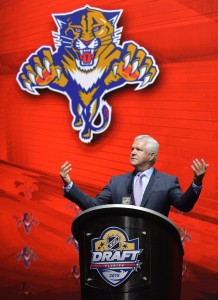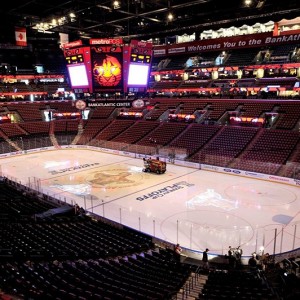Though winning the Stanley Cup is the goal of all thirty NHL clubs, for some teams, a deep playoff run can be the difference between red or black ink on the balance sheet at the end of the season. While many traditional-market clubs face intense pressure to win from fans and media, Florida’s pressure is primarily financial. For the Florida Panthers, the math is simple: a little playoff success now = future profit. Conversely, losing on the ice = losses on the balance sheet, both now and in the future. That’s due to the unique character of the Florida sports market.
Florida: A Market Like No Other

“Hockey won’t work in Florida” is an opinion voiced with regularity across the internet. It’s an opinion at odds with reality, however, as evidenced by the Tampa Bay Lightning’s average attendance of 18,823 last season (good for ninth in the NHL). What won’t work in Florida is losing hockey…or losing in any other sport, for that matter. Take a look at the attendance figures for South Florida’s other major pro sports teams:
- Miami Marlins – In their World Series-winning 2003 season, the Marlins averaged 16,290 (44.8% of capacity, 28th of 30 MLB teams). The following season, average attendance jumped to 22,091 (60.6%, 26th of 30). In 2015, their twelfth consecutive non-playoff season, the Marlins drew 21,632 per game (57.8%, 28th of 30).
- Miami Dolphins – In 2008, the 11-5 Dolphins lost in the AFC Wild Card game. Average attendance that season was 65,489 (87.1%, 20th of 32 teams). The following year, attendance rose to 67,542 (89.9%, 19th of 32). After six consecutive non-playoff years, attendance through three games in 2015 is 64,869 (86.3%, 20th of 32).
- Miami Heat – In 2003-04, the Heat lost in the Eastern Conference Semifinals after failing to qualify for the postseason the previous two years. They averaged 15,239 fans per game (77.8%, 24th of 29 teams) that year. The next season, after acquiring superstar Shaquille O’Neal, the playoff-bound Heat’s attendance jumped to 19,881 (101.4%, 4th of 30). Despite missing the playoffs in 2014-15, four NBA Final appearances in the previous four years kept attendance at 19,712 (100.6%, 6th of 30).
South Florida truly is a market like no other, in that all professional sports must compete not just with each other for fans’ attention and entertainment dollars, but also with the myriad activities available year-round: golf, boating, fishing or simply lounging on the beach, to name a few. Competition for entertainment dollars is particularly fierce in Sunrise, from which the high-traffic tourist destinations of Orlando and Cape Canaveral are a quick three-hour drive north, the Parrot Head paradise of Key West is four hours down Highway 1 and the beach is just 45 minutes to the east. In short, the Panthers have to ice a team just as exciting as Disney World, Duval Street and the space program. While winning certainly fuels excitement, so does adding superstar-level talent to your roster.
The Jagr Effect

Much has been written about the impact of future Hall of Famer Jaromir Jagr on his young teammates. Jagr’s impact reaches beyond the ice, though: His presence on the roster was undoubtedly a factor in the Panthers’ season-opening sellout crowd of 19,424, and after last Saturday’s 4-2 loss to the Dallas Stars, a visit to Pantherland, the BB&T Center fan shop, found Jagr t-shirts sold out, save for a single toddler-sized no.68.
While the veteran winger’s main goal is to hoist the Cup one more time, he also wants to change the perception of hockey in South Florida. Immediately after signing a one-year contract with Florida last April, a reporter asked Jagr what it was like, being in a hockey market where he could “…go out and not necessarily be recognized and swarmed by…” autograph-seekers. While some players, particularly those accustomed to playing in one of the NHL’s higher-profile markets, could be expected to comment that such relative anonymity would be a nice change of pace, Jagr’s response came without hesitation:
Well, let’s change it…It’s up to the fans…they’re gonna come, it’s just a matter of time. If you play good, if you start winning, the middle of the season, they’re gonna come…I hope they come, I wish they come, because it’s a lot more exciting to play before 20,000 than 10,000.
The exchange begins at the 3:35 mark of the video below:
Just Win, Baby
The Florida Panthers, more than many other NHL clubs, have to win to pack ’em in. Jaromir Jagr understands this, and it’s a sure bet the rest of the organization understands it, as well. Even fans get it, as indicated by this Tweet from the Cats’ opening-night 7-1 win over the Flyers:
What the Florida Panthers are doing tonight, will change South Florida’s interest in hockey.
— Louis Joseph Agudelo (@F_I_Lou) October 11, 2015
General Manager Dale Tallon has assembled a talented and deep roster. Ownership continues to work to put the team on sound financial footing. It’s now up to Coach Gerard Gallant and the players to execute. As the late Al Davis said, “Just win, baby.”